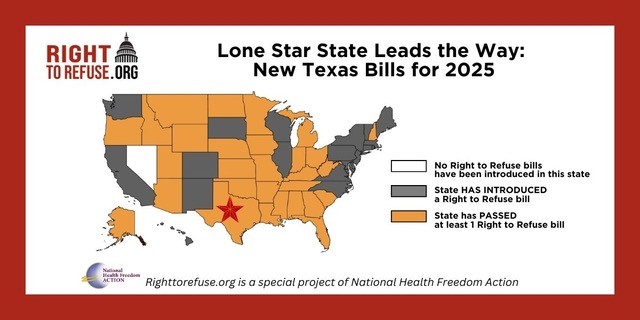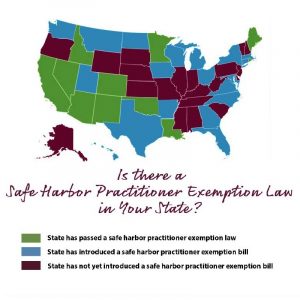

With legislatures across the USA gearing up for 2025 sessions, lots of new Right to Refuse bills are being filed. So far, Texas leads the way with at least 16 bills covering a wide variety of Right to Refuse issues. Topics covered include the right to refuse medical treatment, warnings for mRNA-containing foods, medical discrimination, strengthening vaccine exemptions, and more! Here are eight examples from Texas’ new proposals:
Constitutional right to say “no” to a vaccine
HJR 91 is a proposed constitutional amendment protecting the right to say no to a vaccine. If passed, it would call for a state-wide vote on the proposal in November 2025. HJR 91 states that:
“An individual has the unalienable and natural right to refuse a vaccination. The vaccination status of an individual may not be made a condition of employment, travel, school or other educational institution attendance, conducting business, receiving governmental services, or any other action in this state…. This proposed constitutional amendment shall be submitted to the voters at an election to be held November 4, 2025.”
Health care facility may not reject vaccine exemptions
HB 1468 would change current law regarding vaccine mandates by health care facilities. Current law allows that vaccine policies “may” include exemptions. This bill states that exemptions “shall” be allowed and that, “A health care facility shall not reject an exemption based on reasons of conscience, including a religious belief, for any reason.” This bill was filed on November 25, 2024.
No discrimination in health care access
HB 1356, filed on November 15, would ban discrimination in health care access based on vaccine status. According to this bill:
“Notwithstanding any other law, a health care provider may not, based on an individual’s vaccination status, deny or refuse to provide to the individual a health care treatment, procedure, or service…. A health care provider who violates this section is subject to a civil penalty of $50,000 for each violation. The attorney general may bring an action to recover the civil penalty and may recover attorney’s fees and costs incurred in bringing the action.”
Medical exemptions shall be accepted
SB 96 adds to vaccine administration requirements and also protects medical exemptions to immunization. Key provisions include that a vaccination provider shall inform patients of the risks and benefits of any vaccine, maintain records of the manufacturer and lot number for any vaccine given, record any health problems resulting from a vaccine, and report all serious health problems post-vaccination to the federal VAERS system, the system for reporting adverse events. As to medical exemptions,
“A governmental official, including an official for a licensing or certification authority, may not question or sanction a health care practitioner for granting a health exemption to the practitioner’s patient—-Notwithstanding any other law, a person, including a state public health official, child-care facility, school, institution of higher education, public or private employer, and medical service or long-term care provider, shall…accept a health exemption [and] exempt the individual described by the health exemption from an immunization requirement imposed by the person or under the laws of this state.”
Informed consent for minor vaccination
SB 95 filed November 12 strengthens Texas’ informed consent rules for minors and adds civil liability for non-compliance. The bill explicitly requires “informed consent” from parents, including that they be provided information about a proposed vaccination including “the benefits and risks of immunization, including any vaccine information statement required by the National Childhood Vaccine Injury Act of 1986,” “the procedures available under the National Childhood Vaccine Injury Act of 1986…to seek possible recovery for unreimbursed expenses for certain injuries arising out of the administration of certain vaccines,” and the “Vaccine Excipient Summary published by the Centers for Disease Control and Prevention for each immunization to be administered.” As to liability:
“If a health care provider fails to obtain the informed consent required by Subsection (a) and the child has an adverse reaction to the immunization, the provider is liable to the person authorized to consent to the immunization for damages in an amount of not less than $5,000.”
HHS may not add to vaccine schedule
HB 468 would prohibit the state’s Health and Human Services Commission from adding to the vaccine schedule for elementary and secondary schools. Also, except for K-12 and higher education vaccine requirements,
“[A] governmental entity may not compel or require an individual to receive an immunization, including an immunization listed on the immunization schedules developed by the federal Centers for Disease Control and Prevention.”
Labeling for mRNA products
SB 119 requires labeling for foods that can contain mRNA vaccine material:
“A person may not sell in this state food injected with an mRNA vaccine or containing any ingredient derived from food injected with the vaccine unless the food’s label includes a clear and conspicuous notice stating the food contains mRNA vaccine material,” and
“A person may not sell in this state a meat food product derived from livestock injected with an mRNA vaccine unless the product’s label includes a clear and conspicuous notice stating the product contains mRNA vaccine material.”
Constitutional right to refuse medical treatment
SJR 10 is a proposal for a state-wide vote on a new constitutional amendment acknowledging the right to refuse medical treatment:
“Article I, Texas Constitution, is amended by adding Section 37 to read as follows: Sec. A 37. Each individual residing in this state has the right to refuse any medical treatment, including a procedure, vaccine, medical device, or prophylactic, and a person may not interfere with or impede that right in any manner.”
As these bills and resolutions show, there are a wide variety of approaches that a state can take to protecting bodily autonomy and the right to refuse. As the 2025 sessions begin, we will keep you updated on legislative actions around the nation!
National Health Freedom Action helps state groups that want to pass laws that protect health freedom. NHFA’s team of attorneys and advocates work with citizen groups, small and large, to provide the training, support, and tools, to help them succeed in their wish to protect health freedom.
If you have a committed group of individuals wanting to change the laws in your state, please reach out to us via email at info.nhfa@nationalhealthfreedom.org to set up an exploratory conversation. We would be happy to help in any we can. That is why we are here!
RECENT NEWS


Blessings to all of our supporters and Happy Thanksgiving!
November 26, 2025


REAL IDs: Refuse this National Surveillance System!
November 13, 2025
